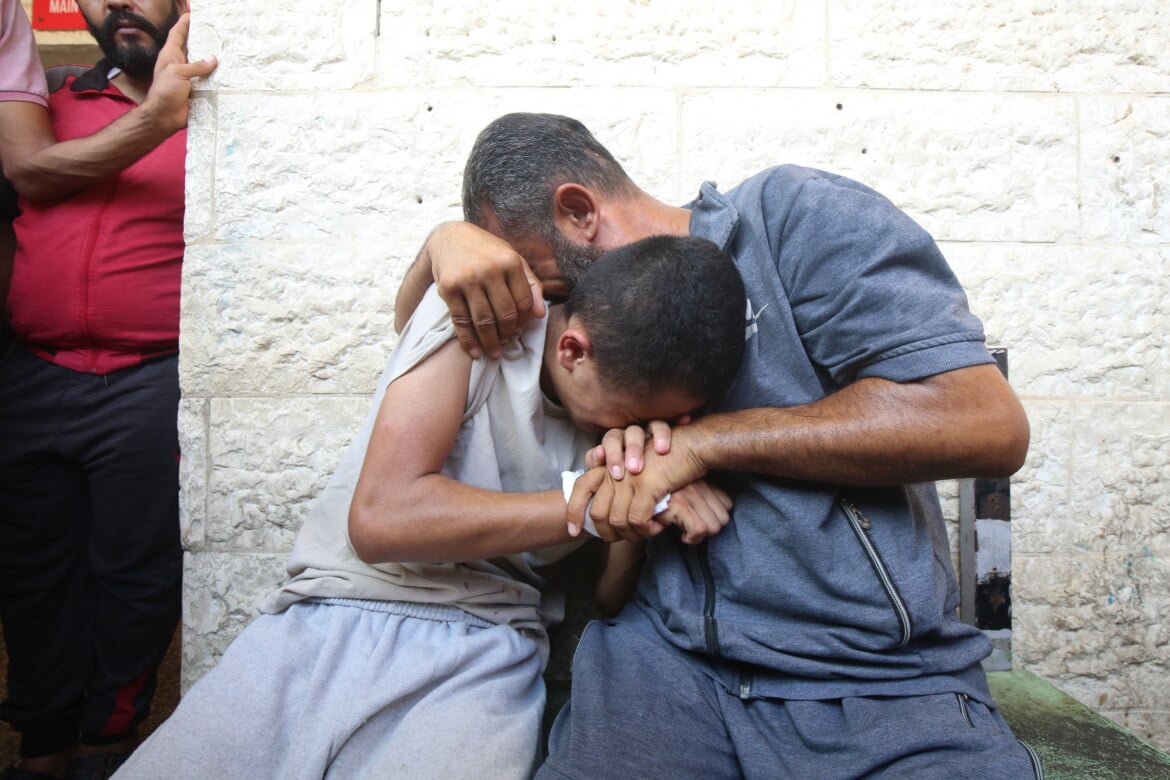Testimony
‘Welcome to hell’: An account of life inside an Israeli prison
The guards always had their faces covered. They would torture us, put a gun to our heads and pretend to shoot us, tell us we were going home in plastic bags. If they saw any of us praying, they would beat everyone in the cell.

Testimony collected in the Occupied Palestinian Territories by Chiara Cruciati. For safety reasons, names, dates of detention and cities of origin have been omitted.
It happened after afternoon prayer, shortly after October 7, 2023. I was returning from the mosque, and Israeli intelligence agents were waiting outside my front door. My ordeal began at the Al-Moskobiya prison [Moscovia Detention Center] in Jerusalem: they beat me in the truck, they beat me on arrival. Israel had arrested me before, and I thought it would be like the other times. Then I realized that everything had changed: even the military doctors were beating me.
After a week, they transferred me to the Naqab prison along with five other detainees. When we arrived, the soldiers told us “Welcome to hell” and beat us with everything they had: batons, sticks, fists. They led us into the cells by dragging us on the floor.
In the cell, I took off my clothes and saw that my body was covered in bruises. I had a dislocated shoulder and wounds on my hands. They beat me again, in a group, the first of countless times. There were eleven other Palestinians in the cell and little else: there were no beds, no furniture. We asked for mattresses. They said there were no mattresses in Hamas’s tunnels. We had no towels, no soap, no toothbrushes.
After 48 hours, I talked to the lawyer in court, and he told me there was nothing he could do. The judge gave the police two days to bring evidence against me. They had nothing, so they used the “secret file” method to request administrative detention. The judge granted it to them: four months. At the end of the sentence, he renewed it by another four. In my prison there were Palestinians of all ages, young and old, and some had been there since before October 7.
They often tied our wrists with plastic ties from morning to night. Sometimes they would also tie our ankles. They kept the light on at night and off during the day. At first we had one hour of hot water a day, then only one hour of cold water a day. Until January, we were without blankets. Then they brought some: they were filthy and stank.
There was little food and it was bad, just enough to keep us from dying. It was getting less and less all the time. Almost-uncooked rice, a few slices of bread and a few pieces of greens. There was no meat or vegetables. I was hungry every day. I lost 27 pounds.
The cells were dirty and we had nothing to clean them. They didn't give us medicine, even to those who had previous illnesses. Scabies spread quickly: it starts with red spots, and if you scratch them, you bleed and you end up with dirty clothes for months. I wore the same clothes for eight months. Those who got out would leave pieces of clothing for the others. We were not allowed to shave, so we were unrecognizable.
You couldn't sleep in the cell, whether because of the pains from the beatings or the screams of the other prisoners. The screams of those from Gaza would cut down to the bone. What I went through can’t even be compared to what they go through.
The guards always had their faces covered. They would torture us, put a gun to our heads and pretend to shoot us, tell us we were going home in plastic bags. If they saw any of us praying, they would beat everyone in the cell.
They would count us three times a day, kneeling on the floor, our hands behind our necks and our heads on the ground; we would stay like that for half an hour. They would pick one of us, drag him outside and beat him. In mid-November, in my prison, they killed Thayer Abu Assab by beating him to death. He hadn’t reached 40 years old; he had been in prison for 20. He had two left to go free.
I could only talk to the prisoners in my cell. After six months of being inside, we were allowed an hour of fresh air. We had to walk all the time, without stopping; if anyone stopped or fell, we all got beaten. That happened a lot. We were all out of strength.
When you’re inside, you lose all sense of time, what day it is, what time it is. We had no books or radio, we were isolated from the outside world. We only got news from outside from the new prisoners.
In the end, they released me. I was with ten other prisoners: they took us away together and dropped us off at a checkpoint near our town. They ended up releasing only me and one other detainee, and the others were taken back to the prison. They do this a lot. When I returned home, I went to see the families of my fellow inmates: I told all of them that their loved ones were fine, even when the truth was that they couldn't get up from their mattresses anymore. They pretended to believe me.
The Israeli authorities took away my driver's license and medical insurance. They took everything from us, our rights and our dignity as human beings. Our grandparents suffered through the Nakba, we are suffering through another one. Here, fighting for one's freedom is a crime. There is no safe place in Palestine.
Originally published at https://ilmanifesto.it/il-carcere-ci-ha-reso-irriconoscibili-le-grida-degli-altri-ti-entrano-dentro on 2024-12-15
